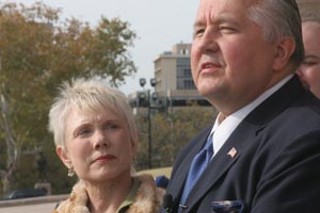Bible Monument Case Thumps Its Way Through Courts
Constitutionality of Harris County display heard in Austin court
By Jordan Smith, Fri., Dec. 16, 2005

Bible Monument Case Thumps Its Way Through Courts One Saturday in 1995, a handful of Houston-area clergy joined then-Harris Co. District Judge John Devine and his court reporter, Karen Friend, outside the Harris Co. civil courts building for a round of prayer and the singing of the "Battle Hymn of the Republic." The occasion was the rededication of a nearly 40-year-old memorial, erected by the Star of Hope Mission for the homeless, ostensibly to honor a deceased benefactor, Houston philanthropist William Mosher. Whether the monument is actually a secular shrine to Mosher, or a religious shrine that uses Mosher as a vehicle to promote Christianity, however, is a matter of contentious debate, strong emotion, and high rhetoric. And now it is also a question at the center of a legal war – the latest battle of which was waged in Austin on Dec. 7, before a three-judge panel of the 5th U.S. Circuit Court of Appeals – that will decide whether the Houston Bible display is a breach of the constitutional line between church and state.
A bible was originally installed outside the courthouse in 1956, the year the monument was erected, but was then pretty much ignored – it wasn't tended to by anyone, not even by representatives from the Star of Hope, and was regularly vandalized, says ACLU attorney Randall Kallinen, who is representing Houston real estate broker and attorney Kay Staley in her legal bid to have the display ruled unconstitutional and have the Bible permanently removed from the display. On more than one occasion the book was stolen, and by the late Eighties the glass case surrounding it was permanently empty, prompting passersby to begin using the slab as a trash receptacle. Former Judge Devine – who ran for office on a "pledge" to bring Christianity back to government – sought to put an end to all of that in 1995, when he and Friend undertook an effort to renovate the monument, add a little neon lighting, and install a new Bible in the case.
According to Harris Co., the monument "suggests nothing sacred" – in part because it is located in a "high traffic area" next to a "noisy street" and does not "lend itself to meditation," Assistant Harris Co. Attorney Bruce Powers argued last week before 5th Circuit Justices E. Grady Jolly, Jerry E. Smith, and Patrick E. Higginbotham. To Staley, however, the monument is a clear violation of the First Amendment's Establishment Clause. She argues that the monument is not an overt homage to Mosher, whose name is mentioned only on its base, carved into the gray stone well below eye level. Instead, a red neon-lit King James Bible encased in glass dominates the display. "This [case] is about religious freedom and tolerance," Staley told reporters. "We're not against religion. We're for everyone getting to practice [religion] in their own way, without government interference."
But that isn't what motivated Devine and Friend to restore the monument, she argues. Indeed, during the original 2004 trial in Houston federal court, Devine testified that the display of a Bible does "promote" a particular religion and argued that there is no "constitutional doctrine" separating church and state. On Aug. 10, 2004, federal District Judge Sim Lake, a Reagan appointee, ruled in Staley's favor and ordered the Bible removed. After brief legal wrangling, the Bible was removed in January, pending the outcome of the case. Lake's ruling did not sit well with Harris Co. officials who have brought the appeal to the 5th Circuit. "I think the point needs to be made that a monument to an individual is different from a religious display," Harris Co. Judge Robert Eckels told the Houston Chronicle.
But there is nothing about the Bible monument (as it has been known and referred to since 1956, even by officials with the Star of Hope) that is in any way secular – nor is there anything about the monument that would lead a "reasonable observer" to conclude that the monument is anything but a state-sponsored religious overture. Indeed, Harris Co. – and thus all taxpayers, Christian and non-Christian alike – pays for the electricity that lights the book (whose pages are turned, occasionally to passages chosen by Star of Hope employees), which Kallinen says is a clear violation of state law. Indeed, in an affidavit filed in the case, Friend said she believes in the "right to communicate the content of the Bible outside the Harris Co. courthouse," attorney Ayesha Kahn, legal director for Americans United for Separation of Church and State, told the three-judge panel – testimony that she said reveals the county's true motivation for defending the neon-lit Bible display.
Prompted by the justices, Kahn conceded that the display had been around for nearly 50 years before Staley filed suit – a nod to the U.S. Supreme Court's ruling earlier this year denying homeless Austin attorney Thomas Van Orden's suit to have a monument to the 10 Commandments removed from the Capitol grounds. The Supremes opined, in part, that the monument's long tenure on the grounds furthered the state's argument that it had a secular purpose; however, they also noted that years of vandalism suggested the monument had never been fully accepted or displayed without controversy. While the justices appeared unconvinced that the repeated vandalism was a sign of public discontent with the monument's religious content, they similarly did not appear swayed by Powers' argument that the Bible was placed under glass and highlighted only to acknowledge Mosher's Christian faith. "But to draw attention solely to the Bible, with red neon – that becomes the primary focus [of the monument]," said Judge Higginbotham. The court's ruling in the case is expected within a month.
Got something to say on the subject? Send a letter to the editor.








